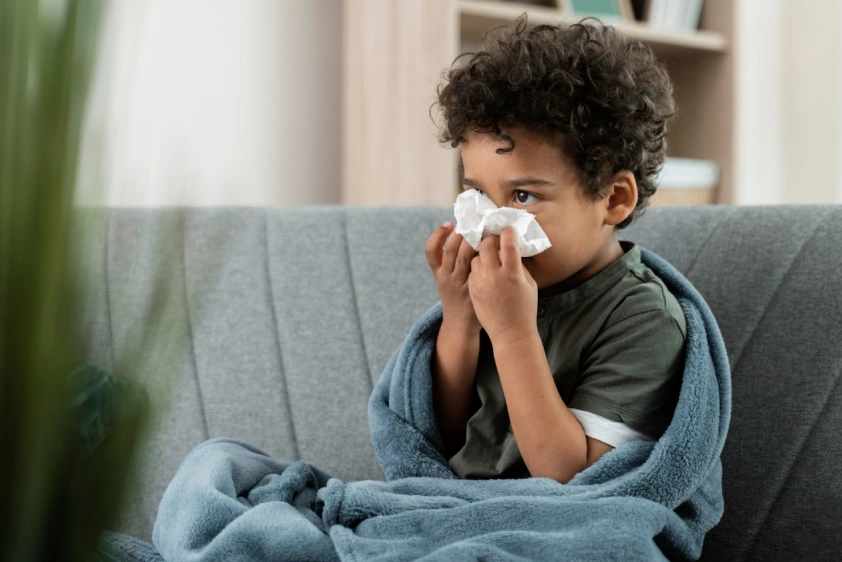Dengue Fever in Children: Symptoms, Stages and Treatment
Dengue fever, spread by mosquito bites, is a serious viral illness that poses heightened risks for children. With cases rising in many tropical regions, parents must be aware of the symptoms and available treatment options. Recognizing dengue fever early and getting timely medical treatment can stop it from developing into more severe conditions like dengue hemorrhagic fever or dengue shock syndrome. Understanding how the disease develops and recognizing when to seek medical help is crucial in safeguarding your child’s health. In this blog, we’ll discuss the symptoms and stages to keep you well-informed and prepared, and why consulting the best pediatrician in Dubai is essential for your child’s care.
Understanding Dengue Fever
Dengue fever is spread through an infected Aedes mosquito, most active in the early morning and late afternoon. The virus is prevalent in both tropical and subtropical regions, including parts of Southeast Asia, Latin America, and the Middle East. Children living in or traveling to these areas are particularly at risk. Dengue symptoms often resemble flu-like illnesses, making early detection challenging. Early detection and timely care at the best hospital in Dubai are essential to prevent the illness from progressing into more dangerous conditions, which can lead to complications like bleeding, organ damage, or shock, posing serious health risks if untreated. According to the World Health Organization (WHO) and other health authorities, early intervention, including proper hydration and monitoring blood platelet levels, is essential for managing dengue effectively. Ensuring timely medical care can help reduce the risk of complications, such as shock or organ failure. If your child exhibits signs of dengue, seeking immediate medical attention from the best pediatrician in Dubai for appropriate care and monitoring is important.
Symptoms of Dengue Fever in Children
While early signs might resemble other common viral infections, it’s important to recognize the key symptoms and warning signs that indicate the illness is becoming more severe. Below is a breakdown of what parents should watch for:
- High Fever: Sudden onset of high fever lasting between 2 to 7 days.
- Severe Headaches: Intense headaches, especially pain behind the eyes.
- Joint and Muscle Pain: Commonly called “breakbone fever,” children often experience deep joint and muscle pain.
- Fatigue: Extreme tiredness and weakness, persisting even after the fever subsides.
- Skin Rash: A rash typically appears 2 to 5 days after the fever starts and can spread across the body.
- Nausea and Vomiting: Many children experience nausea, vomiting, and abdominal pain, which can worsen as the illness progresses.
- Warning Signs of Severe Dengue: Persistent vomiting, bleeding gums, nosebleeds, and restlessness are indicators that the illness may be progressing to a more severe stage, such as dengue hemorrhagic fever or shock syndrome.
In severe cases, immediate medical attention is crucial. Parents should seek urgent care at the best hospital in Dubai to prevent complications.
Stages of Dengue Fever
Dengue fever follows a distinct progression through three stages: the febrile phase, the critical phase, and the recovery phase. Understanding each stage is key to ensuring your child receives the right care at the right time.
- Febrile Phase (2 to 7 Days):
This is when the fever hits hard. Your child might experience a high fever, severe headaches, joint and muscle pain, and rashes. It’s easy to mistake it for a common viral infection, but dengue tends to cause more intense discomfort. During this time, it’s crucial to keep your child hydrated and manage the fever but avoid aspirin or ibuprofen as they can increase the chances of bleeding. At this stage, you should take them to the best hospital in Dubai to monitor any worsening symptoms.
- Critical Phase (24 to 48 Hours):
Here’s where dengue can be deceptive. The fever might start dropping, and you may think your child is getting better—but this is the most dangerous phase. Fluid leakage, bleeding, and a sharp drop in platelet levels can occur during this period. Keep an eye out for warning signs like vomiting, severe abdominal pain, or unusual bleeding (gums or nose). This is when immediate medical intervention is essential. Consulting the best pediatrician in Dubai could make all the difference in preventing serious complications like dengue shock syndrome.
- Recovery Phase:
Once through the critical phase, the body starts to recover. Your child’s energy will slowly return, their appetite will improve, and the fever will fade. Sometimes a rash reappears, but it’s less concerning at this point. Hydration remains crucial, even though they might seem fully on the mend. Continue monitoring them closely to ensure they don’t relapse or experience lingering symptoms.
Dengue fever in children can be alarming, but understanding the symptoms, stages, and treatment options helps manage the illness effectively. Acting quickly when warning signs appear and seeking care at the best hospital in Dubai is crucial. Prevention is key, so protect your child from mosquito bites and stay informed to ensure their health and safety.





